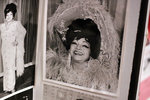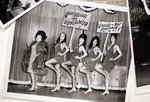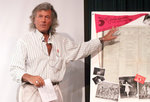





Working in the gardens of his Greece home, Don Horn said he felt the hand of the deceased Gracie Hansen on his shoulder.
It was that presence and the intensive research that followed, he said, which allowed him to clearly write her biography, which he titled simply “Gracie.”
Although he never met her, Horn said Hansen changed his life. Through her, he said, he discovered that it is okay to be kind of outrageous. He started noticing parallels between his life and Hansen’s.
Hansen had a gimmick in dress with her large feathered hats, bold jewelry, furs and large personality. Horn said he too has gimmicks in his appearance: a constant tan and the habit of wearing shorts with no shoes.
Hansen did it all – acted, danced, sang, directed, produced. Horn, too, acts, directs, produces and writes.
At first, Horn said he could not find much information about Hansen’s life, but one thing led to another. Hansen’s step-sister, Jeanette Gum, contacted him, for one.
“The doors started opening,” he said. “It was amazing. Once the ball started, it rolled.
The results are bountiful.”
Horn wrote not one, not two, but three books about Hansen’s life and work. He self-published the books and they are now also available on the Kindle.
The first book Horn wrote about Hansen is a biography titled “Gracie.” The second is the tale of her notorious showgirl act in the 1962 Seattle World’s Fair called “Gracie Hansen’s Paradise,” and the third is titled “The Lost History of Portland, Oregon: Hotel by the Name of Hoyt.”
Horn’s musical about Hansen, called “Gracie: A Musical Adventure,” opens May 3 and runs through May 27 at his Triangle Production Theater, 1785 N.E. Sandy Blvd., Portland. Productions begin at 7:30 p.m. Thursday, Friday and Saturday, and at 2:00 p.m. on Sundays.
Tickets range from $15 to $35. For more information, call (503) 239-5917. The website is www.tripro.org.
Horn hopes to next go on a book tour to share the life and times of Hansen and he hopes the musical will become part of the World’s Fair’s 50th anniversary celebrations held in Seattle.
Watch Gracie’s Life Story
Don Horn’s mini-biography of Gracie Hansen, including footage of her telling her life story, is online at youtu.be/pST-ns2atHs
Gracie Hansen Sunday event in Morton
By Candice Stanford
For The Chronicle
MORTON — We’ll never know for sure, but perhaps what motivated entertainer Gracie Hansen’s frenzied career was a favorite quote by Henry David Thoreau: “Most men lead lives of quiet desperation and go to the grave with the song still in them.”
Hansen is shown roughly interpreting this quote in a video made by author and playwright Don Horn about Hansen’s life. The public was invited for a viewing of the biographical video at the Morton Roxy Theater on Sunday.
The story told through archival footage in the video begins in Centralia with Gracie Hansen’s Paradise staging plays in her garage. The teenager charged attendees 5 cents. She said she always wanted to be a movie star.
Later, married and living in Morton, she initiated and produced what became known as the PTA Follies from 1953 to 1958. Ten young housewives with some twenty-six children between them starred in the chorus line. Hansen hired a dance teacher to instruct them on how to dance. Productions sometimes had up to 100 people in the casts, all Morton residents that Hansen recruited.
“Everyone has a little ham in them,” Hansen quipped about the extensive participation of neighbors and friends.
The Follies were fundraisers which benefited the community, raising as much as $1,000 to fund community projects such as purchasing chairs for the school’s auditorium. People came as far away as Seattle to see them. Later the show went on the road to Tacoma, Centralia and Chehalis.
The last Morton PTA Follies were held in 1958 as the performances had become a little too racy for PTA standards.
“Some of the things were too adult for the PTA,” Hansen said.
She fell into a slump after that. Hansen said she was very ill, very broke and feeling very sorry for herself. A friend gave her a pep talk, suggesting she take her follies show to the World’s Fair in Seattle.
“I thought she was absolutely right,” Hansen said. “And I got well immediately.”
Hansen took her chorus line show to the 1962 World’s Fair in Seattle where she earned the title Queen of the Seattle World’s Fair. Her show, from topless dancers to a trained dog, was the talk of Seattle.
There was a time, Hansen said, when she did many, many things she did not want to in order to fit in, to belong. She got over it.
“A lot of people are afraid of what other people will think. What will people say. What will people think. . . well, who gives a damn. If I listened to all the opinions I’d still be an unhappy, frumpy, fat housewife in Morton,” she said. Hansen divorced Leo Hansen in 1959.
From 1965 to 1971, Hansen performed at the Hoyt Hotel in Portland, in what was called the Gracie Hansen’s Roaring Twenties Room. There, she produced, acted, sang and told jokes with three shows a night, six days a week filling the 500-seat theater.
In 1970, she ran for governor of Oregon with a pin slogan of “Best Governor Anyone Can Buy.”
In the video, you hear Hansen’s addressing her constituents with, “I feel I know what the average Oregonian wants. In fact, I try to get a little myself every now and then.”
While in Portland, she also wrote a newspaper column.
From 1980 to 1985, she did “stand-up” comedy from a wheel chair as diabetes took her toes, feet and leg.
Hansen died in 1985 due to complications from the disease.
After the video showing, Horn asked the 50 some theater attendees consisting of Morton residents, family and friends if anyone had a story about Gracie that they’d like to share.
Jeanette Gum, Hansen’s step-sister, relayed family history of how Hansen ended up in the Northwest. Her father, Salvatore “Sam” Mirable, was a barber, Gum said. The family lived in Shreveport, La., and had heard about all the loggers in the Northwest with long hair and no barbers in the area. In 1924, Mirable moved his family to the Longview area.
Hansen’s father died in 1930; her mother remarried in 1936, moving to Centralia with her new husband, Hansen and Hansen’s younger brother Carl. Jeanette and George were products of Hansen’s mother’s second marriage.
Jeneva Partridge told the story of how in 1957, fresh out of the University of Washington, she and her pharmacist husband moved into the Lindley Apartments in Morton. Her husband had found his dream job in Morton. Partridge recounted how one day Hansen and the apartment owner knocked on her door and without Hansen making any introduction she asked her to turn around, and then to sing Yankee Doodle.
“Yep, it will work,” Hansen said, and that is how Partridge was recruited to fill a chorus line position vacated by someone who had just moved out of town. And then there she was, Partridge said, not much of a singer, but singing and tap dancing across the stage.
Mike Fairhart recalled as a young boy living in Morton seeing Hansen at a family gathering with a sketch book, sketching ladies in fancy dresses. In retrospect, he said, she was probably designing the outfits for an upcoming Folly production.
Fairhart also remembered as an 18-year-old running into Hansen at the Seattle World’s Fair, and all she was concerned about was finding Elvis Presley’s manager in order to schedule a luncheon date with Elvis.
“Oh, we just had a ball. She was a lot of fun,” said Joan Van Cleve, Morton’s Ford dealership owner. “My husband and I were recruited along with almost everyone else in town.
“It was a lot of fun. Everybody knew everybody. It was like one big family,” Van Cleve said of the Folly days in Morton. “We really thought it was something when asked to dance for the Shriners in Tacoma in 1957.”
Van Cleve said she was a Folly dancer, wearing a can-can outfit. Her husband played a variety of roles in productions, including an Indian Chief and a logger — “And he never logged in his life,” she said.
Van Cleve said Hansen was way before her time and belonged in Hollywood.
“A lady to do that (the Follies) in a small town like this, you know she’s special,” said Van Cleve.
Admission to the March 11 video viewing at the Roxy Theater raised $425, which goes towards supporting the theater, Horn said.
Horn’s next Hansen-related project is to garner support and funds for constructing a statue of Hansen in Morton. Presently, he has an artist working on a concept drawing.